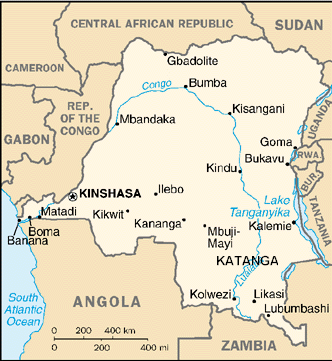

Status Quo Side: Congo (Zaire)
Non-Status Quo Side: Katanga Province
Region: Africa
Conflict Type: External Intervention
Issues in Dispute: Ethnic, Independence, Resources
Maps: [U Texas Congo/Zaire
maps]
[UNHCR Map of Africa]
Katanga province's President Moise Tshombe requested Belgian paratroopers to quell rebels in the chaos following the Congo's independence from Belgian rule. The UN created a UN peacekeeping force for the Congo (ONUC). On July 11, just prior to ONUC's arrival to arrange Belgian withdrawal, Tshombe declared Katanga independent.
Tshombe ordered mobilization to resist the UN force, which he called "Lumumba's agent" referring to leftist Premier Patrice Lumumba. ONUC neutrality in the dispute between Lumumba and President Joseph Kasavubu, each of whom dismissed the other, made possible the peaceful entry of UN peacekeepers. Events culminating in Lumumba's murder in February 1961 engendered crises in the Congo and also the UN and Africa. This reinforced Tshombe's position, now supported by an army led by white mercenaries. ONUC was authorized to use force to end Katanga's secession. On August 28 UN troops began rounding up mercenaries in Katanga. Tshombe refused negotiations.
ONUC attacked, declared the secession ended, but agreed to a truce on September 21. Dissatisfied with this compromise, central government forces invaded on October 30 but were routed. With a renewed UNSC mandate, ONUC attacked again on December 5 but desisted on December 18 when Tshombe agreed to unity talks. When these failed a year later, ONUC attacked and finally overcame Katangese resistance. A monumental crisis ensued in the UN featuring Soviet political assaults from the left on the UNSYG, and from the right by thwarted Katanga-based mining interests and their political supporters in Europe and the US.
Katanga surrendered to ONUC and the Leopoldville government. A January 17 agreement permitted Congolese civil and military personnel to supervise reintegration.
The Congo became Zaire in 1971, its capital Leopoldville renamed Kinshasa. With the defeat of Zairean government forces in 1996 and the departure of dictator Mobutu Sese Seko in the spring of 1997, the victorious rebel leader Laurent Kabila renamed Zaire the Democratic Republic of the Congo.
[Library of Congress country study of
Zaire 1993]
[Contemporay Conflicts in
Africa - Democratic Republic of Congo]
Copyright © 1999 Lincoln P. Bloomfield and Allen Moulton